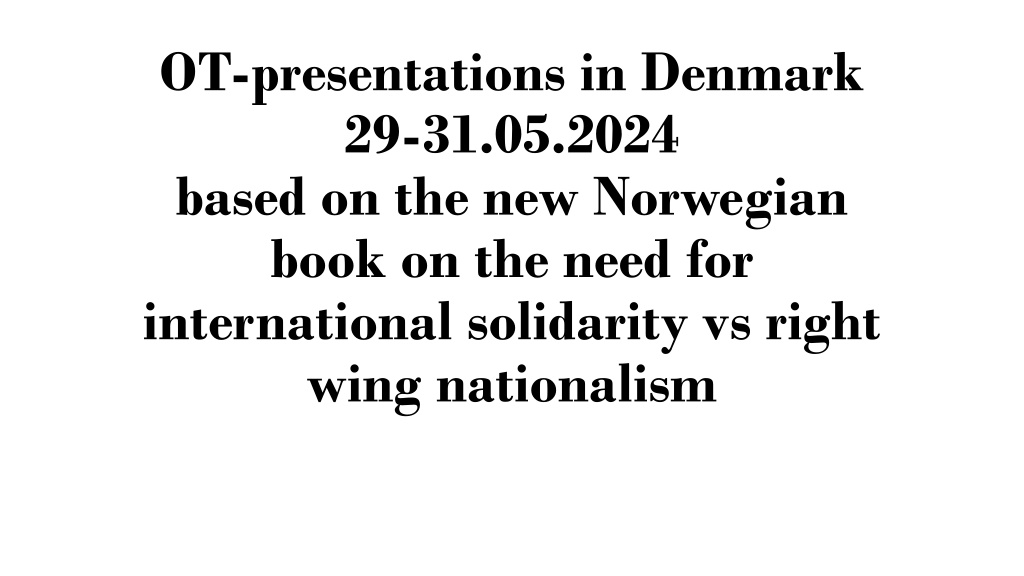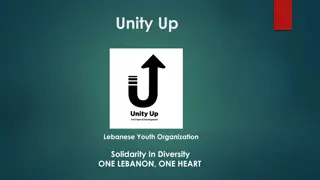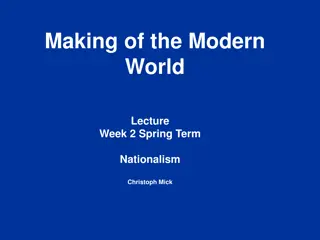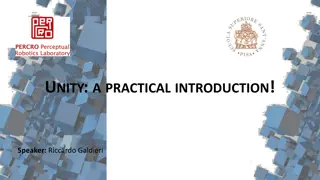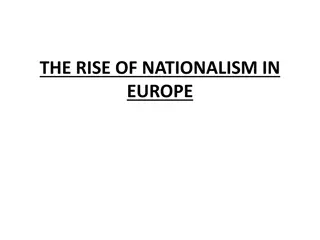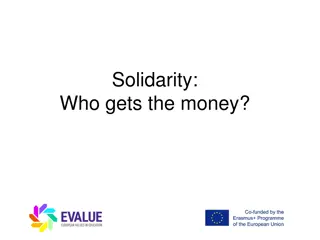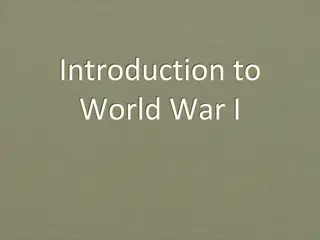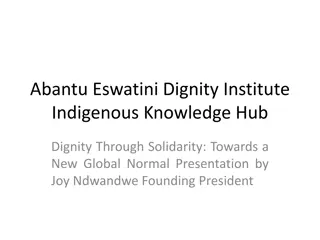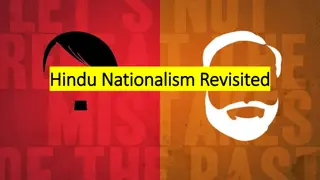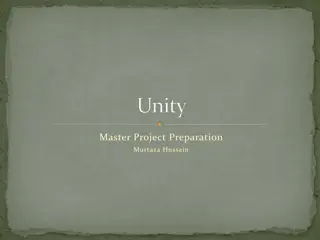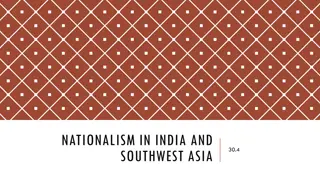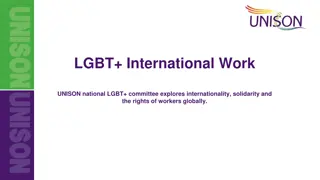International Solidarity vs. Right-Wing Nationalism: A Call for Global Unity
The upcoming presentations in Denmark are centered around a new Norwegian book emphasizing the crucial need for international solidarity to combat the rise of right-wing nationalism. The book sheds light on the shared responsibility of countries in addressing global crises, reiterates the importance of human rights, and emphasizes the ineffectiveness of isolationist policies. It calls for reinventing North-South alliances and highlights the necessity for a broad international struggle against emerging global challenges. The context outlines the critical discussions to be held in Aarhus and Roskilde universities, focusing on reinventing social democracy and analyzing the impacts of right-wing nationalism on global politics and development studies.
Download Presentation

Please find below an Image/Link to download the presentation.
The content on the website is provided AS IS for your information and personal use only. It may not be sold, licensed, or shared on other websites without obtaining consent from the author. Download presentation by click this link. If you encounter any issues during the download, it is possible that the publisher has removed the file from their server.
E N D
Presentation Transcript
OT-presentations in Denmark 29-31.05.2024 based on the new Norwegian book on the need for international solidarity vs right wing nationalism
(Title Aarhus: Fairbar, rhus Univ, VIA, 29-30/5) What happened to global solidarity? Reinventing North-South Alliances (title Roskilde Univ. 31/5) Right Wing Nationalism from the point of view of Global Politics and Development Studies
Book based on research on the South, and North-South relations. Driven by critique of inward-looking Nordic politics late 2015-> 1. The anti-refugee policies neglects the fact that our countries share the responsibility for why people must flee, and that universal HR are needed to fight the causes 2. Adjustment to the nativist idea of making our countries great again and to regain national control neglects the basic international problems 3. Only fighting Putin s aggression against Ukraine and defend the liberal world order, behind NATO, is defective. Putin s is not a new Hitler. Right-wing nationalism is global. And it has gained prominence because of popular dissatisfaction with the combination of reckless global neoliberalism, defective democracy and undermined progressive alternatives. NATO is neither meant to nor able to fight this. Hence, Gjenreising av det Globale Felleskapet is necessary.
Also an element of anger but illustrative Interest in books on Reinventing Social Democracy (Scanidnavia- India) and In Search of new Social Democracy (Comparative South, and North) diminished with the new inward-looking priorities. A brief Swedish version was blocked as no more funds for info. about the South. Now politicians even decide on civil society cooperation in the South. And funds for development research have been scrapped. So, I resumed work with old friends/colleagues in Norway. Based on our previous research and voluntary work, this book was produced in a year only with support from the foundation Fritt Ord for the freedom of speech, from the LO, and the Church. And some inputs from old Danish friends So while new attempt to at a similar book in Sweden, I also wanted to get to Denmark
In any case, we might like to discuss some of the points of departure later on: 1. That our countries share the responsibility for the refugee crisis 2. That yesterday s people s home welfare policies now calls for internationalism to be realistic. 3. That more room of manoeuvre for nation-states presupposes internationalism. 4. That the same applies to industrial policies and struggle vs climate change. 5. That Putin is not the only strong-man in town. So there must be broad international struggle against the common causes for global right-wing nationalism and the emerging new cold war.
In brief, our point of departure is thus that the struggle against the current multiple crisis can t only be based on defending the liberal world order because it is part of the problem. The wave of democratisation since the late 70s and the positive aspects of the victory in the cold war were undermined by their own neoliberal preconditions and defective elitist democratisation and interventions. Which has undermined liberal democracy elsewhere too, and the classical social democratic oriented alternatives, in the North and the South. And paved the way for global right-wing nationalism In short, liberals and leftists must acknowledge that our own priorities and failures have contributed to the rise of right-wing nationalism. Hence, there must be alternative democratic international cooperation.
How did it happen? The causal chain: Attempts (2012-2016) to resume internationalism collapsed with (i) the refuge crisis, (ii) the failed attempts at a global deal between unions & employers, (iii)the negative effects of market driven globalisation for many people. This was because the credit market had been deregulated in the 1980s followed by the third road policies The arguments for this adjustment were: (i)that neo-liberalism had become hegemonic; (ii)that there was a new international division of labour; (iii)that the regulations of currencies & movement of capital had been scrapped; (iv)that OPEC had increased the oil prices without buying more products from us. SO the national Keynesianism, which social democracy adhered to, had been undermined. Even Mitterrand had to give up 1983.
BUT THIS WAS NOT INEVITABLE! There were two counter movements! The causes for why they failed is the core of the book! First : Palme/Brandt & like-minded: New Economic World Order, & North-South partnership to internationalise Keynesianism BUT: (1) Opposition from US, its allies, capital & some of Palme/Brandt's parties & unions. (2) Weakened like-minded partners in the South: (i) Selfish oil sheiks (ii) Statist authoritarian development in East Asia with TNCs (iii) Liberation movements were economically weak (iv)The commitment to democracy against colonialism, racism, imperialism was set aside during the Cold War by liberals as well as socialists/reform communists in favour of stronger states states that were hijacked by military and businessmen. Efforts continued , but no power behind the words.
Second counter movement: Liberal wave of democracy. (The core of the third major part of the book) More liberal than the previous anti-colonial wave, now against authoritarian regimes and social injustice Started 50 years ago in Lisbon/Portugal, Spain, Greece Latin America, parts of Asia, Eastern Europe, Africa etc Strengthened by the West's victory in the Cold War. Basically the wave was about negotiated democracy, with popular support. Which had proved possible in southern Europe.
Four arguments for democratisation 1. Less state-controlled economy 2. Negotiations with reformists about new democratic rules of the game/institutions - to which even the powerful are assumed to adapt. Plus more conservative idea that a strong state must come first, "sequencing democracy". 3. interventions against the enemies of democracy - "wars against terror" 4. In contrast, radical liberals and social democratically oriented actors: genuine democratisation indeed possible, but only if vulnerable people were also strengthened and included. What happened? None of the arguments really proved viable. Seven out of ten people live in non-democracies again. Globally, rightist (& some leftist) 'strong-leader-regimes' taken over. Few exceptions (e.g. Kerala & Latin America's Brazil, Chile and Colombia) demands for the rule of law and freedoms...
Why did first the anti-colonial & then the liberal wave of democracy fail? Are there any openings? Book looks into several critical cases, as politics is contextual but the general results points to three prime causes, and one way ahead 1. Fragmented class base No broad bourgeoisie and strong working class for democracy. Nothing like the same investment in the South as in the Northwest after WW2. Partial exceptions of South Korea and Taiwan. New international division of labour predatory. Increased growth but very uneven and Palme/Brandt et al. failed to build an alternative to global neoliberalism, so the working class was divided, capital was getting increasingly mobile, and regarding taxation, work conditions, welfare, destructive energy race to the bottom
2. Fine attempts from the bottom up" but without coordination The struggle from below, by way of localised democratisation, and through different movements around different issues and ways of subordinating people, have been difficult to combine and scale up. (Problems even in the few success cases of Brazil (unable to affect top-politics), and Kerala (top-down attempts to fix insufficient co-operation and finance from top-down).
3. Democracy set aside in the struggle against colonialism/ imperialism, global neo-liberalism could not be contained, liberal wave of democratisation dominated by elites. Democracy devalued during the Cold War, from both the West (liberals and west- oriented soc-dems.) against nationalist-socialists/communists --; and from the East (reform-driven communists/left-nationalists who first opted for liberal democracy but then gave priority to the struggle against imperialism). Both camps for a strong state which was captured by powerful politicians, officers and businessmen. Thereafter the liberal wave of democracy could rarely rely on broad popular movements (which had been eliminated). In addition, the socialist block had lost out, and global neoliberalism was hegemonic. Strong support (also internationally) only for the primacy of agreements/pacts between powerful reformists, who set the rules of the game. Pro-democrats rarely got a chance to get into organised mainstream politics but were referred to civil society as watchdogs and pressure groups. Also the return of politics of order/sequencing democracy terror wars against
Signs of a way ahead Broad democratic alliances, e.g. -socio-economic rights based safety nets/reforms (even in Indonesia ) - progressive coalitions vs right wing nationalism (as against compromises with conservatives) (e.g. Colombia, Chile, Brazil, S India) -green new deals (Lula et al. ) -common work to handle environmental disasters (Kerala) Best when behind democratically organised reform packages -negotiated and designed with stakeholders (lessons from Scandinavia) Need to also be backed by international solidarity -e.g. FES/Indonesia (initially Aceh..) Possibilities to build international alliances of like-minded on strategic issues
In conclusion the setbacks for democracy in our critical cases in the South enabled the rise of global neoliberalism and then couldn t contain it during the liberal wave. This has undermined liberal democracy and nationally confined social democracy in the North and South and opened up for right-wing nationalism. Need for political renewal to promote the openings in terms of broad alliances and democratically organised reform packages through international cooperation. International solidarity that is not aligned with any of the major imperial blocks and is based on the UN-principles. From the North this may be promoted by progressive actors together with governments (as in Brazil, Chile, Colombia) and regional governments (as in Kerala) plus popular movements and activists.
